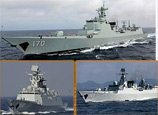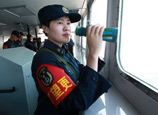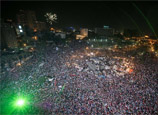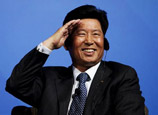
LA PAZ, July 4 (Xinhua) -- Bolivian President Evo Morales will meet with counterparts from the Union of South American Nations ( Unasur) later Thursday to discuss the rerouting of his flight earlier this week when several European countries denied his plane access to their airspace on suspicions that Edward Snowdon was on board.
The Bolivian Air Force plane, a French-made Falcon Dassault, landed at around midnight local time (0400 GMT) Wednesday after a 17-hour trip including refueling stops in the Canary Islands ( Spain) and Fortaleza (Brazil).
After Portugal, Italy, Spain and France denied the Bolivian plane access, it was then forced to land in Vienna, Austria, where it remained at least 14 hours before resuming flight.
Morales and his entourage were returning to Bolivia from Moscow, where he had attended a meeting of gas-producing countries.
The unprecedented denial of access to a presidential plane with immunity has angered south American countries, and Ecuador's President Rafael Correa spearheaded the idea of convening a meeting on the incident.
The meeting will be attended by at least Argentine President Cristina Fernandez, Venezuela's Nicolas Maduro and Uruguay's Jose Mujica.
International organizations such as the United Nations (UN), the Organization of American States (OAS), the Bolivarian Alliance for the Americas (ALBA), the Andean Parliament and the Ibero- American Secretariat, have also condemned the denial of access.
"I believe this is an open provocation to the countries of South America. They will never intimidate us," said Morales as he arrived in La Paz.
"Surely, the empire and its servants have fallen in this situation, but this is not a time for empires," Morales added, referring to suspicions that the United States, which wants Snowden on espionage charges, had pressured the European countries into denying airspace access. So far, the U.S. has neither confirmed nor denied it.
Bolivian Vice President Alvaro Garcia Linera said several South American presidents announced they will attend a meeting in the central Bolivian city of Cochabamba, to jointly redress Morales' " kidnapping".
Meanwhile, Argentina's 1980 Nobel Peace Prize winner Adolfo Perez Esquivel condemned the incident and asked the UN to sanction the European countries who led to his 14-hour detention at the Vienna airport.
Perez Esquivel told Xinhua by phone that he "strongly condemned " the incident and added "France, Spain, Portugal and Italy have violated international law and insulted the presidential office of Evo Morales and of all Latin Americans."
The Argentine Nobel laureate praised "the presidents of Unasur for their rapid response" and for "calling for an extraordinary meeting" of the bloc leaders to discuss "in depth this grave incident."
He praised the "firmness of the Bolivian authorities" who had " prevented the presidential airplane from being inspected, as the international press affirmed."
"This serious incident, this attitude by the European countries, as requested by the United States, cannot go with impunity and has to be sanctioned by the UN," he noted.
















 Man swims in flood to deliver food for pregnant wife
Man swims in flood to deliver food for pregnant wife


![]()
